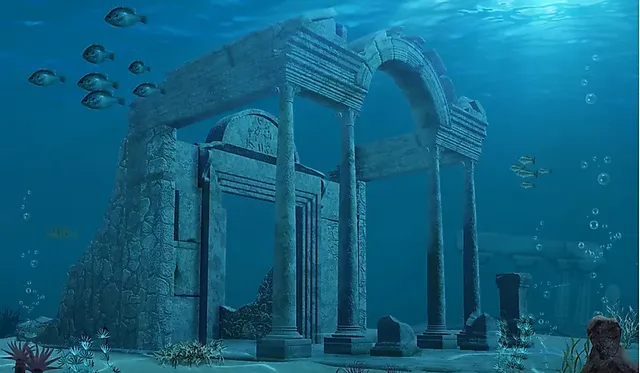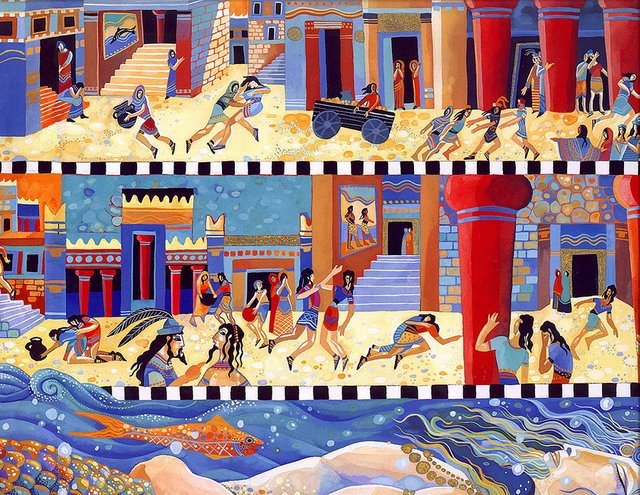The Lost City of Atlantis

There are many definitions and opinions about the lost Atlantis (English: Atlantis), also known as Atlantica, and it is said that it is one of the legendary islands located in the Atlantic Ocean region, specifically on the western side of the Strait of Gibraltar.[1] The legend of Atlantis has spread since About 2500 years ago, it was used to refer to a society characterized by having a set of advanced achievements, whether in the field of engineering, architecture, and buildings, military strength, or natural resources. Another definition of Atlantis is that it is a place the size of a continent, and contains many plants, animals, pure water, rich soil, and other features.
The story of the lost city of Atlantis

The story of the city of Atlantis and its lost civilization became part of the human imagination for many years, and no information or historical and archaeological indications appeared about it. A mystic named Critias participates in this dialogue through his talk about the city of Atlantis.
Description of the lost city of Atlantis

In his writings, the philosopher Plato notes that the lost city of Atlantis was ruled by the Greek god of the sea, Poseidon, who made sure to use Atlantis to express his appreciation for his wife by building a large house for her on a hill in the middle of it. The philosopher Plato also explains that the inhabitants of the city are engineers who possessed advanced and advanced technology that surpasses other world regions. As for the inhabitants of the villages of the wealthy class in Atlantis, they inhabited the mountains. As for the end of the legend about the city of Atlantis, it will be with the wrath of the god Zeus. Zeus destroys the city of Atlantis or not, she is satisfied with mentioning Zeus's feast to teach Atlantis a violent lesson.
The Legend of the Lost City of Atlantis

In his writings, the philosopher Plato notes that the lost city of Atlantis was ruled by the Greek god of the sea, Poseidon, who made sure to use Atlantis to express his appreciation for his wife by building a large house for her on a hill in the middle of it. The philosopher Plato also explains that the inhabitants of the city are engineers who possessed advanced and advanced technology that surpasses other world regions. As for the inhabitants of the villages of the wealthy class in Atlantis, they inhabited the mountains. As for the end of the legend about the city of Atlantis, it will be with the wrath of the god Zeus. Zeus destroys the city of Atlantis or not, she is satisfied with mentioning Zeus's feast to teach Atlantis a violent lesson.
Theories about the lost city of Atlantis

Many theories emerged about the lost city of Atlantis, and all of them were keen to provide reasons for the disappearance of this city, and also contributed to drawing pictures about its shape and nature, and the following is information about the most important of these theories: [5] Atlantis was a continent: It is the theory that refers to the city of Atlantis on That it was a continent that appeared in the middle of the Atlantic Ocean, and was subjected to sudden sinking, and this theory is linked with the realization that Atlantis is a place that actually exists, and not a myth authored by Plato, and this theory appeared at the end of the nineteenth century AD through the book of the author Ignatius Donnelly entitled "Atlantis - A world before the Flood.” The book contained a debate about the achievements that appeared in the ancient world, and the writer linked them with the existence of a civilization with an advanced environment. Donnelly provided a description of Atlantis, saying that it was a continent that sank with water based on the place that Plato identified in the Atlantic Ocean, and referred to by the existing rocks. at the Strait of Gibraltar. Atlantis disappeared into the Bermuda Triangle: a theory inspired by the ideas of the writer Donnelly; Many authors were keen to expand the study and establishment of theories and predictions about the place of Atlantis, and the most important of those writers was Charles Berlitz, who wrote many books about phenomena and supernatural events, and one of the predictions that Berlitz indicated that Atlantis actually existed, and it is one of the continents located opposite The Bahamas, but it disappeared in the Bermuda Triangle, and some people who support this theory indicate that they found traces of roads and walls off the coast of Bimini, but scientists studied these walls and roads, and they were able to reach a group of natural forms. Atlantis is Antarctica: It is the theory that indicates that Atlantis is only a developed image of Antarctica at the present time, and this theory belongs to Charles Hubbod through his book published in 1958 AD entitled "The Transforming Crust of the Earth"; Habod believes that the Earth's crust underwent a transformation about 12,000 years ago, and as a result, the location of Antarctica changed from its location to a very remote location, and he says that this continent was the site of one of the advanced civilizations, and the change in its location led to the burial of the Atlantean civilization under the ice. Mythical novel: It is the theory that tells that the city of Atlantis is nothing but a fictional place. As for the story of its loss, it is derived from one of the historical events, related to the flood that affected the Black Sea approximately in the year 5600 BC. The Black Sea at that time was a lake that forms a lake. Half its size in the current era, and spread around it many civilizations that faced floods coming from sea water. The Minoan civilization is Atlantis: It is a theory that says that Atlantis is the Minoan civilization that existed during the time period between 1600 to 2500 BC. It is a civilization that appeared on the islands of Terra and Crete, one of the islands belonging to Greece. This civilization is the first in the continent of Europe, and it contained many beautiful roads and palaces. Plato's invention of Atlantis: It is the theory that links Plato and his invention of the city of Atlantis; That is, it did not actually exist, but appeared as a result of Plato's ideas, and that the Platonic accounts of the existence of Atlantis are nothing but a fantasy.